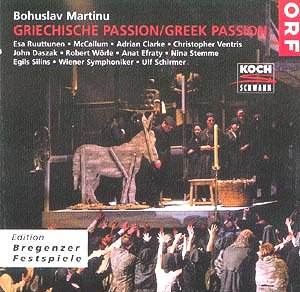Martinu
Greek Passion (original version)
 Bregenz Festival production
Bregenz Festival production
Vienna Symphony Orchestra/Ulf Schirmer with Moscow Chamber Choir, Bregenz
Children's Choir & soloists including Christopher Ventris, Nina Stemme,
John Daszak, Esa Ruuttunen & Egils
Silins.
 Koch 3-6590-2 [131
mins]
Koch 3-6590-2 [131
mins]
Crotchet

This original version of Martinu's opera, based upon the Kazantzakis novel
Christ Recrucified, belatedly produced at Bregenz and then at Covent
Garden conducted by Sir Charles Mackerras at long last (reviewed there by
Seen&Heard
April 2000) has arrived for consideration in the same week as did
Birtwistle's The Last Supper, which deals with iniquities through
the ages committed in the name of Christianity (Glyndbourne Touring Opera).
Mackerras's recording of the revised version, with singers of the Welsh National
Opera and the Brno SPO, was previously
reviewed , and these two links will give
you a full account of the chequered history of an opera, composed in English
for Covent Garden, which took so long to reach that destination. Why it was
shelved is rehearsed also in the 120 page booklet with this release, explaining
how Rafael Kubelik's enthusiasm was thwarted by the Opera House Board.
It is now generally agreed that the 'London version' - characterised by abrupt
changes of style, tonality to atonality, contrasting emotions juxtaposed
in rapid succession, with spoken words to arioso, solo instruments to full
orchestra, more a cinematic concept than a normal opera - is superior to
the 'Zurich version' revision. The chorus, divided between local inhabitants
and unwelcome refugees, is the real protagonist and most of the leading solo
roles are relatively small in length, but the shepherd-Christ figure Manolios
(Christopher Ventris) is drawn three dimensionally as an essential
part of the whole Passion story, with its clear contemporary resonances.
The opera proceeds to its inevitable tragic denouement at pace. As Katerina,
the Mary Magdalene figure, Nina Stemme is particularly affecting.
This recording has the small disadvantage against the other that the cast
is not one of native English speakers, but their diction and the clarity
of the text (which is printed in full also) does all credit to the preparation
of this live performance, taken from the Bregenz Festival in June 1999. Ulf
Schirmer steers his forces, with its numerous cast of mostly fairly
unfamiliar singers, admirably, and the recording quality is good, with the
orchestra well forward, which I like better than the opposite.
I have no hesitation in preferring the far more original first conception
and it is good that Greek Passion, which meant so much to its
composer, is now becoming well known and established in the repertoire. Both
recordings are highly desirable and purchasers of the two will have no regrets
for taking the opportunity to compare the very different versions and to
explore in depth for themselves a fascinating and important saga in operatic
history.
The Covent Garden production was staged so spectacularly and successfully
that it must be revived there!
Peter Grahame Woolf

